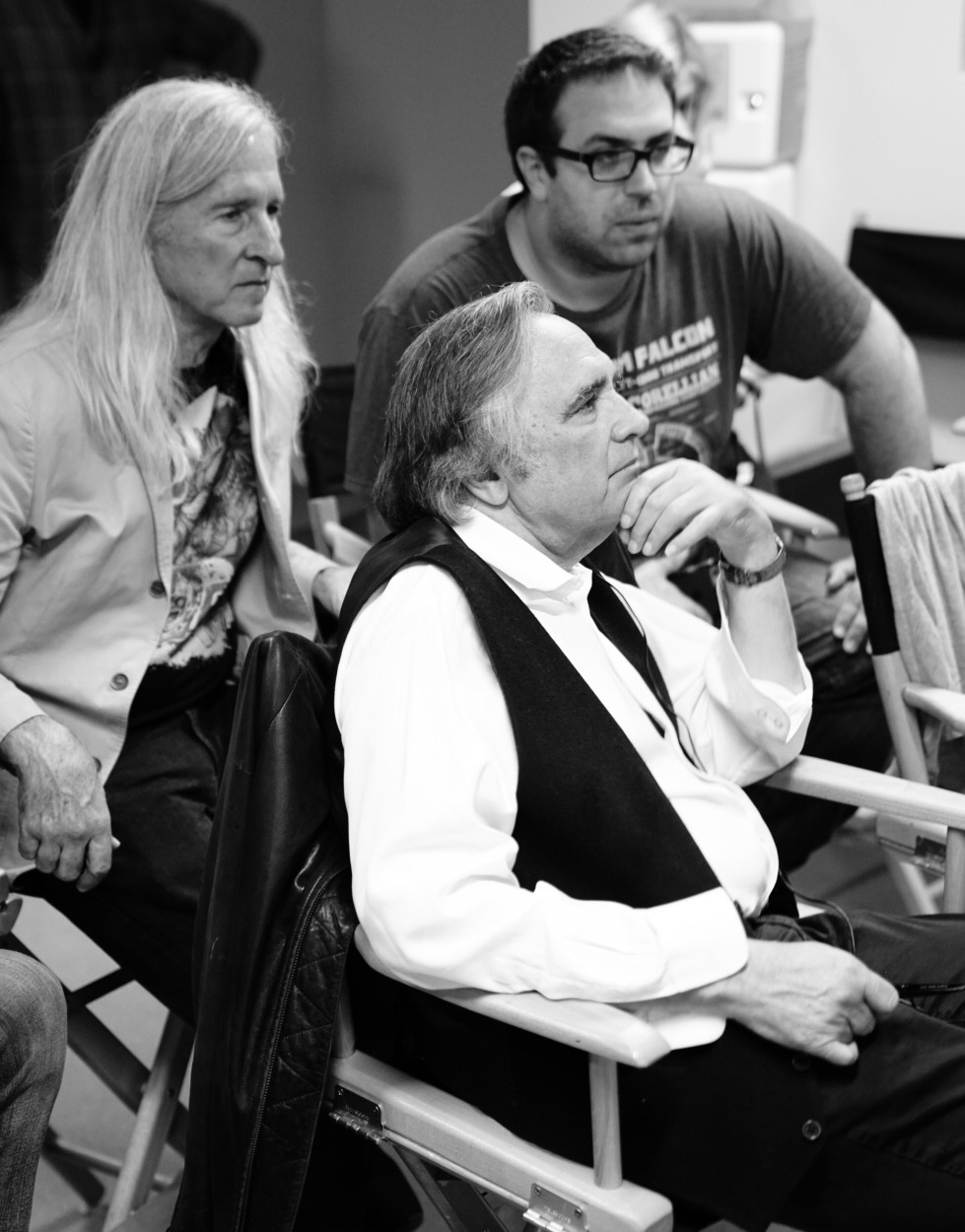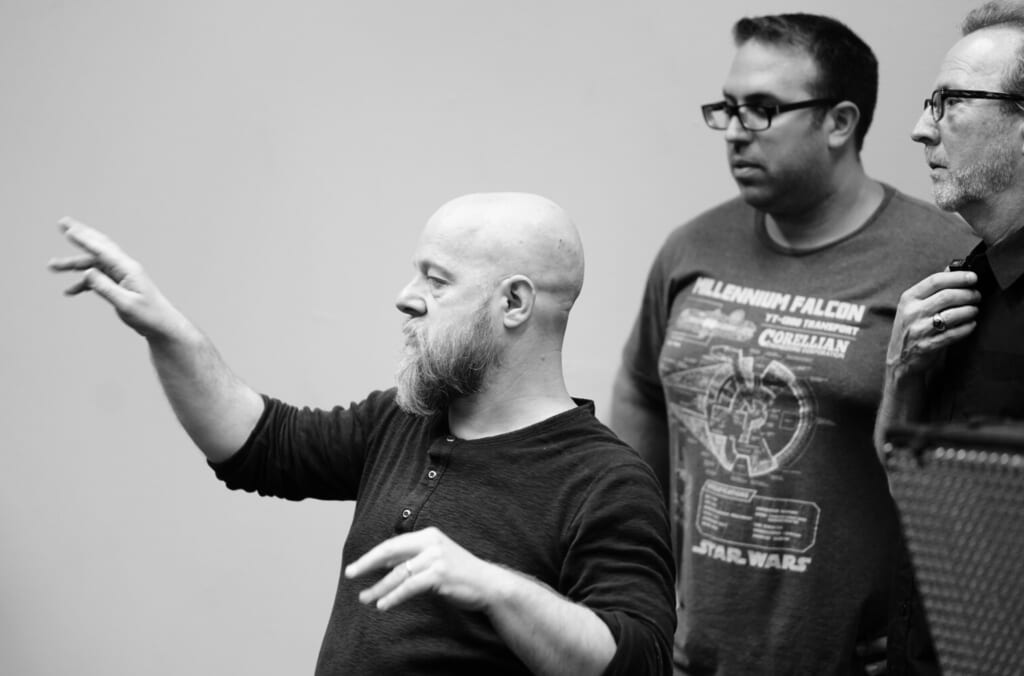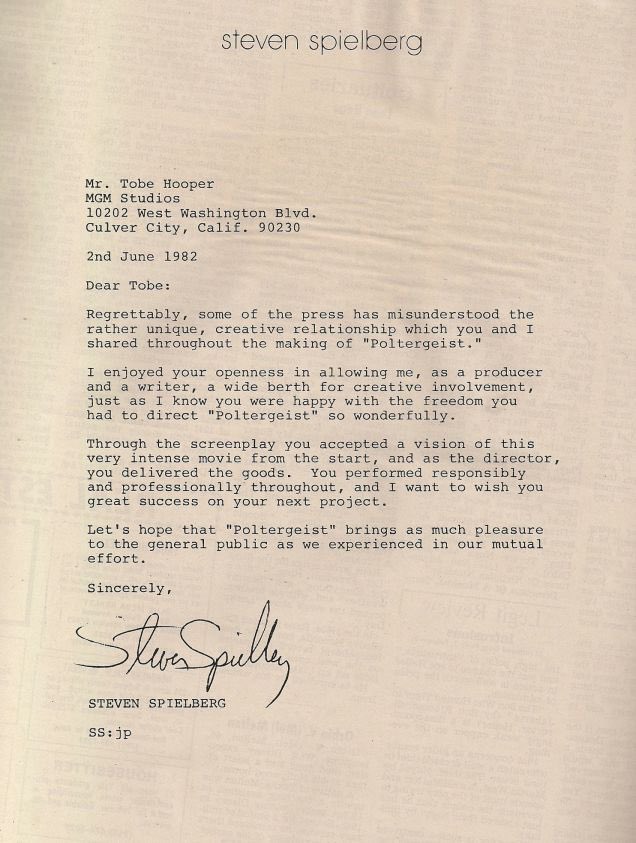Spielberg, Hooper and ‘Poltergeist’: How Auteur Theory Cursed a Classic

I am sick of people suggesting Steven Spielberg directed Poltergeist and not Tobe Hooper.
It’s been forty years and this shadow still towers over one of Tobe Hooper’s greatest accomplishments.
Why we don’t universally celebrate this late-horror icon for directing not one, but TWO revolutionary horror films is one of the most annoyingly enduring film conspiracy theories of all time. And it seems like every six months it gets drudged up again.
Well, on the eve of the movie’s 40th anniversary, I’m here to try to put it to rest for good.
So, why am I — a burgeoning filmmaker who was born two years after Poltergeist was even released — the right person to expound on this topic?
In all fairness I’m probably not. But…
I have spent the last several years as the producer of the POST MORTEM podcast where we meet and document legendary horror filmmakers’ careers. Tobe has come up fondly in several of these conversations, as has the topic of Poltergeist.
The closest I came to this mystery myself, though, was in 2018 when an exec at MGM let me, my writing partner, Chris LaMont, and The Grudge‘s Stephen Susco tinker around with a possible legacy TV sequel series. Side note, this remains one of my favorite unrealized projects (the rival horror series from later that year which knocked it off course is a story for another day…).
The point is, that I approached all the research I did on the project and all the conversations I had for the podcast without a real dog in the fight. If anything, I was more biased toward Steven Spielberg. He’s my favorite director.
But Steven Spielberg did not direct Poltergeist. Tobe Hooper did.
People have fabricated this grand conspiracy about the making of this movie. That Spielberg hired Hooper as a surrogate, stand-in director so that he could get around some vague Director’s Guild rules or a potential strike (which would’ve impacted Tobe Hooper, too).
Mostly this narrative seems to come from an actress who was only on set a few days — and allegedly didn’t like Tobe — and a camera assistant — who would go on to become a cinematographer and filmmaker. They just happened to bring it up while making the press rounds promoting his own movie.
But if Tobe Hooper was anything other than a director on this project, he was the victim of auteurship.
If you’re not familiar with auteurship, it’s the reason why everyone always obsesses over the director of a movie. It’s a film theory that arose out of France in the 1940s, mostly in connection with Orson Welles’ rise with Citizen Kane. It centers around the conceit that the director is the sole creative influencer on a motion picture.
Critics, entertainment journalists, and cinephiles love the idea of a maverick director — one whose creative stamp is uniquely and wholly their own. And, in 1982, there wasn’t a filmmaker they loved to place that crown upon the head of more than Steven Spielberg.
And why wouldn’t they?
Coming out of the 1970s, a revolutionary era in Hollywood filmmaking, Spielberg was the perfect blend of his more independent-minded contemporaries. He knew how to tap into the high artistry that critics admired and the excitement general audiences loved. He was then — and still is — the ideal Hollywood director.
That means Tobe Hooper wasn’t just directing his first studio movie — a Herculean task in and of itself. He was doing it in the growing shadow of a living auteur legend.
While Spielberg had executive produced a few movies up to that point, Poltergeist was his first as a full-fledged producer. It was also the first time he’d hand off a screenplay he’d written to another director. Having seen what other filmmakers have done to my own screenwriting — for better and for worse — for someone who loves directing so much, handing over the creative reigns to someone else at nearly the height of his Hollywood powers, must’ve been difficult for Spielberg.
So, it’s no wonder he stayed involved. It’s no wonder he was on set as much as he possibly could be. He wanted to make sure his screenplay would become a successful enough movie he could launch his own production label off it. Without the success of Poltergeist, we might not have gotten Amblin and its fabulous run of motion pictures.
With all that on the line, Spielberg was a very hands-on producer, seemingly much more so than he would go on to become. I learned this while producing Nightmare Cinema with Mick Garris — one of Spielberg’s 1980s Amblin acolytes. From what I gleaned — and have since implemented in my own producing — Spielberg was much more about enthusiastically cheering his creatives on than trying to dominate their visions.
Regardless of whether 1982 Spielberg the Producer had learned this lesson himself yet, or not, when the press visited the set and behind-the-scenes photos were taken, who wouldn’t want to snap a picture of the current “king of Hollywood” running around set? He was the story. “Steven Spielberg Produces Haunted House Movie for MGM” is a headline — and a much more grabby one than “Cult Director Makes Next Horror Picture”. Think of it as the equivalent of 1980s clickbait.
But while the press and studio marketing departments might’ve pushed the Spielberg narrative to help sell the movie, Tobe Hooper was actually making the movie.
You see, just about anyone who has ever made a movie knows the auteur theory is kinda bull shit. Sure, director’s have their hallmarks. Martin Scorsese’s famous “oners”. Quentin Tarantino’s crackling dialogue. Michael Bay’s explosions. Those stamps let us know a creator’s voice is in the picture, but their movies are still the collective works of hundreds of people. Writers, producers, actors, artisans.
And it’s because Poltergeist feels so “Spielbergian” — in the look, the tone, the setting, the music, the sentimentality, the close-ups — that people want to rush to the narrative that Spielberg was the sole creator. But it’s just not true.
First, we can look to three subsequent Amblin films: Gremlins, Goonies, and Back To The Future. They were all done by different filmmakers, and yet, all undeniably Spielbergian. Yet, somehow, we never accuse Joe Dante, Richard Donner, or Robert Zemeckis of taking a back seat to Steven Spielberg. So what gives?
Tobe had the blessing, and the curse, of being first in this lineup of amazing movies. Because of that, and because of our obsession with all things auteur, it was hard to imagine another filmmaker disappearing into the Spielbergian guardrails we’d already become so accustomed to even in 1982. And, yet, this happens in filmmaking all the time.
My pandemic-released debut feature, The Au Pair Nightmare, was to be a “domestic thriller”, something the producers could see playing for a Lifetime audience. They wanted a movie that was lightly chilling and not so scary a woman at home would spill her chardonnay while watching. But, as much as the producer’s global parameters defined the look and tone of the movie, I still directed the movie.
The producers may have run on set and asked me to get another take where the villain wasn’t holding the knife because they feared it’d be too scary in the edit. But that doesn’t mean they directed the movie.
When we were running behind due to a production snafu, my writing partner helped by supervising the initial blocking of the next scene on the schedule, but that doesn’t mean he directed the movie.
The point is, it takes a village to make a motion picture. What drives the creative and logistical impulses of a movie — or why the producer, writer, or director are doing what they’re doing on set — might not be apparent to a day-playing actor or a below-the-line crew member. It’s a tired analogy, but they’re really only seeing the tip of the iceberg.
And, look, I know there are lots of photos of Spielberg “pointing” on the set of Poltergeist. But, as we’ve already established, he was the buzzy story. And, quite frankly, anyone with enough stroke on a movie set can get a unit photographer to take a few photos of them sitting by the monitor.
For example, here’s me on Nightmare Cinema, with fellow producer Mick Garris, NOT shadow directing Joe Dante. Or me NOT shadow directing David Slade.

But Tobe Hooper’s involvement with Poltergeist dates much further back than the first day of production. He helped put the germ of the idea in Steven Spielberg’s head.
After Close Encounters Of The Third Kind, Spielberg explored making a scary alien picture. At one point, being a HUGE fan of The Texas Chain Saw Massacre, Spielberg invited Tobe Hooper to direct. But Hooper was more interested in making a haunted house movie with Spielberg. That’s when the initial idea divulged into two: one a suburban set story about an alien and another about a haunted house — E.T. and POLTERGEIST.

And, I’ve got to tell you, as a screenwriter who has now worked with three different directors on three different productions, there are a LOT of conversations that happen behind the scenes. Ideas are casually traded back and forth over endless discussions. No stone is left unturned. But, that doesn’t mean I directed the movie for them, either.
Given the close, collaborative nature of the relationship — and Spielberg’s dominant position in the Hollywood echelon — is it really no surprise that Tobe listened to and implemented his screenwriter and boss’s ideas?
With their power imbalance, it’s not hard to imagine this dynamic resembled what the modern television show-runner and director relationship looks like. The show-runner is typically a writer/producer who determines the story, look, feel, style, and tone of a television series. The director is then hired on to help execute that vision.
And, somehow, we don’t discredit television directors for working under this creative supervision. So we shouldn’t discredit Tobe Hooper for working under Spielberg’s. A few anecdotes and set photos from questionable sources don’t really prove anything other than Steven Spielberg was on set for a movie he was writing and producing.
In our Tobe Hooper tribute episode of POST MORTEM, Mick Garris discussed this with Texas Chainsaw 2 stars Caroline Williams and Bill Mosley. Having been one of the publicists on Poltergeist, Mick was on the set of the movie frequently. He can attest to Tobe directing under a strong collaboration, and that this wasn’t the first time Spielberg had trouble taking a complete back-seat to a director:
“Yes, I would see [Steven] climb on the camera and say, ‘Maybe we should push in on a two-shot here, or do this or that there.’ And Tobe would be watching. Tobe would always be calling action or cut. Tobe had been deeply involved in all of the pre-production and everything… Tobe directed that movie. Steven Spielberg had a lot to do with that movie too. It happened to Bob Zemeckis on Used Cars. Kurt Russell said to Spielberg, ‘I can take direction from you, or I can take direction from Bob Z. I don’t care who it is, but it can only be one of you, it can’t be both of you.’ And Steven backed off and said ‘You’re right I’m sorry.’ Nobody did that for Tobe.”
Mick Garris
But, even with a Spielberg-gone-wild, Mick is quick to point out that Steven and Tobe’s relationship endured beyond Poltergeist:
“All of the preproduction was done by Tobe. Tobe was there throughout. Tobe’s vision is very much realized there. And Tobe got credit because he deserved that credit, including Steven Spielberg said that. [Tobe] did Amazing Stories for Spielberg. And then I produced another show for Spielberg, The Others, one of my jobs was to hire the directors. And I said to Steven, ‘I really think Tobe would be perfect for this’ and Steven said, ‘You’re right. He’s a great director. Let’s bring him in.’ And [Tobe] kicked its ass. So there was not bad blood between Tobe Hooper and Steven Spielberg. They came together on that. Then they did Taken together.”
And, I’m sorry to say, all you Poltergeist conspiracy theorists, but you don’t work with a director THREE MORE TIMES if you aren’t happy with their work.
Recently, screenwriter Wil Zmak told me an anecdote about drinks he had with Tobe Hooper at the 2005 International Horror & Sci-Fi Film Festival (a festival I, ironically, attended during college and, sadly, was the only time I had the chance to meet Tobe Hooper). A fan approached Tobe and asked him about the Poltergeist controversy, to which Tobe replied: “What you should do is go ask the actors who really directed Poltergeist.”
Well, in 2019, Scott Derrickson, the director of Sinister and the upcoming The Black Phone (which is a quite wonderful movie), did just that. He tweeted that he had recently asked POLTERGEIST’s star, Craig T. Nelson, about the controversy and Nelson happily debunked the rumor that Spielberg directed Poltergeist.
So, there you have it, folks. Tobe Hooper directed Poltergeist.
Of course, don’t take it from me. Take it from Steven Spielberg.
The writer/producer tried to nip this controversy in the bud with the below letter, apologizing to Tobe Hooper for how the marketing and press had portrayed their collaboration:

The reality is, movies can belong to more than just one person.
I just completed my second collaboration with JUAN OF THE DEAD’s Alejandro Brugués, an upcoming Netflix horror movie, THE INHERITANCE. Alejandro directed. I co-wrote. It is BOTH our movie. Just like Poltergeist belongs to BOTH of its creators — Steven Spielberg AND Tobe Hooper.
But, regardless of all the persistent rumors, the speculation about what may-or-may-not have actually happened on set, the result was a wonderful movie that we’ve all been lucky to enjoy for forty years. And, at the end of the day, when it comes to this controversy, only one person’s opinion really matters —
If Steven Spielberg says Tobe Hooper directed Poltergeist, then Tobe Hooper directed Poltergeist.
Follow Joe Russo on Twitter.
Categorized:Editorials News

